





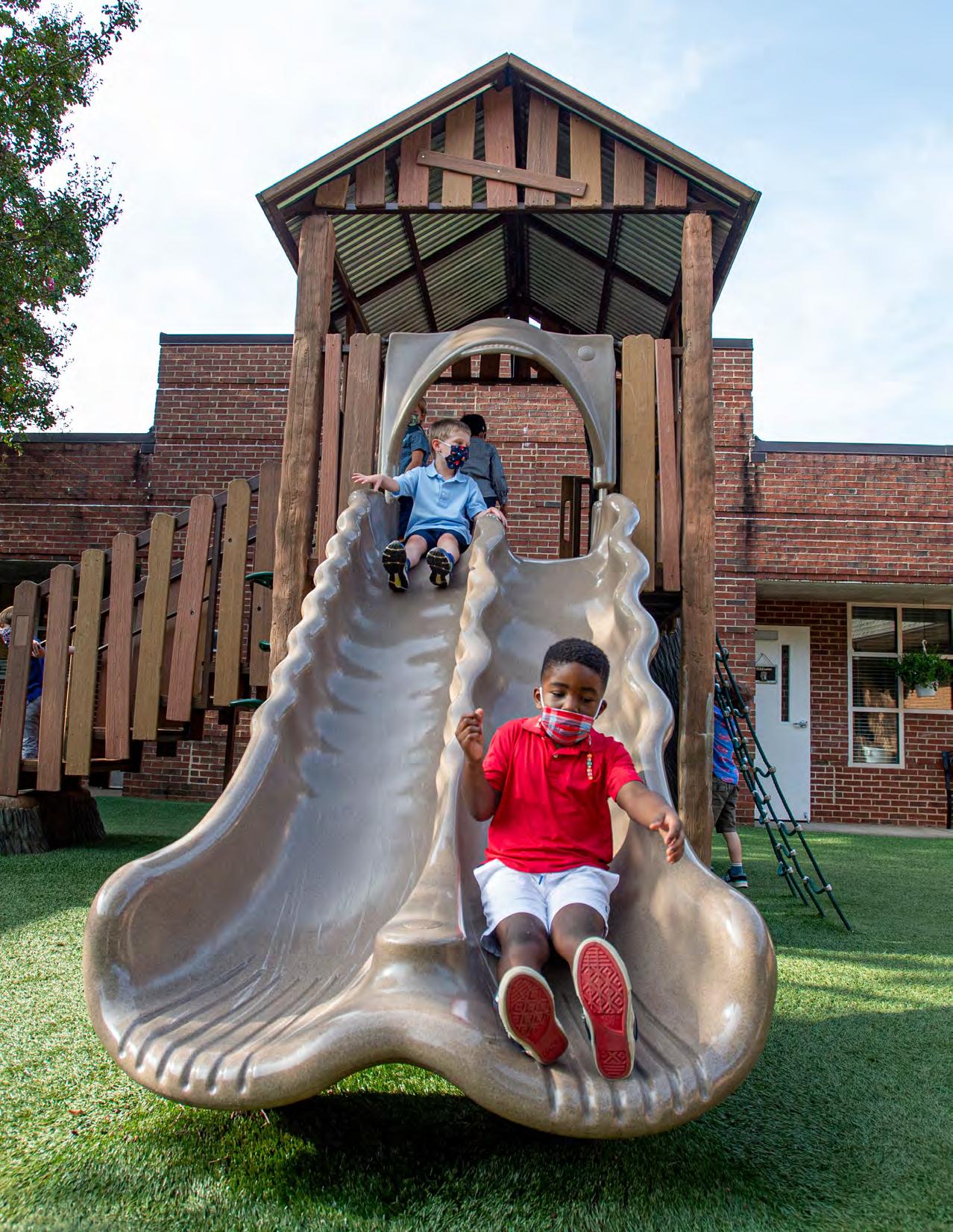
We recognize that diverse points of view are vitally important to an environment of
We strive to be a community where students, faculty, staff, and parents can be their authentic selves, emphasizing respect for self and others.
We commit to teaching a multicultural and global curriculum that reflects the diversity of our community and the world.
We believe it is important to hold each other accountable by promptly addressing bias and stereotyping within our community.
We view missteps and misunderstandings as opportunities to grow and learn from each other through civil discourse.
We believe in developing within our students an ability to appreciate and value the differences among people in our school community, as well as those in the larger world around us. Providence Day School is committed to actively cultivating an inclusive community that reflects and embraces the diversity of the human experience. We are intentional in cultivating multiculturally aware, global citizens who acknowledge their social responsibility, and who are empowered to take action to foster equitable communities.
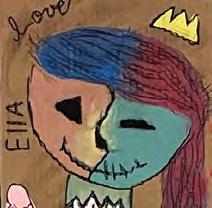




In a project included in the 20-21 third grade art curriculum, students explored the life and work of Black American artist Jean Michel Basquiat. The students learned about his life through the storybook Radiant Child by Javaka Steptoe. Afterwards, they analyzed the different features of Basquiat’s work and then the students set about applying what they learned to the creation of a self-portrait in the Basquiat style. This project also provided students with an understanding of the importance of Basquiat’s influence in providing future Black artists with greater options and access to display their work, in the heretofore White-dominated Modern art scene of New York City. This was one of many units throughout the TK-12 art curricula that focused on artists of color.
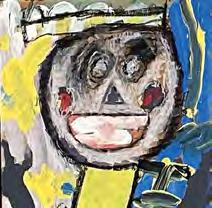



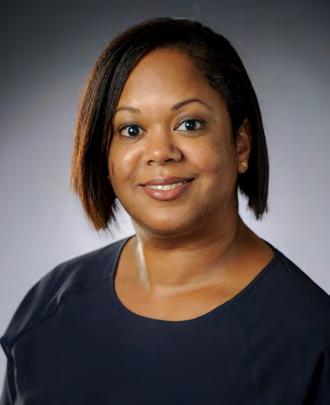
Dear Chargers,
In my 11 years here, I have seen tremendous growth: the student body and faculty have grown considerably, the West Wing is gone, and we have two new buildings and a parking deck. But the growth I am most proud of is in diversity, equity, and inclusion. Over the years, our campus has become more diverse in its racial, ethnic, religious, and national origin composition as well as other measures. This was not by accident but rather through intention. School administrators, trustees, faculty and staff, alumni, students, and community leaders have partnered to make the school more diverse, equitable and inclusive. However, while we have certainly come a long way, there is still a long way to go.
This multimedia summary report provides the opportunity to reflect on the last several years, and ultimately, to provide a clear vision forward in continuing to create a community where everyone feels they belong. The foci of the report include: Data and Demographics, Curriculum, Connectivity, Faculty Training, Policies, and Programming. The section on curriculum includes videos that feature members of our TK-12 community, so be sure to click to view those. Throughout this report, you will find many other active hyperlinks that lead to more rich sources of information.
It’s hard to believe that my time at Providence Day School has come to an end, as I begin my role as Assistant Head of School for Curriculum and Community at Castilleja School, an independent school for girls and young women grades 6-12 in Palo Alto, California. It has been a great honor to serve the PD community that has given me so much both as a faculty member and as the Director of Equity and Inclusion. I look forward to witnessing the leadership of Tyrone Jean, who becomes the Director of Equity, Inclusion, and Belonging in July 2021. The leadership of PD is looking forward to making this report a recurring annual tradition. I’m confident the stories he will tell in this space will show continued growth, and I wish him and the entire PD community all the best.
Sincerely,
 Dr. Nadia Johnson Director of Equity and Inclusion
Dr. Nadia Johnson Director of Equity and Inclusion
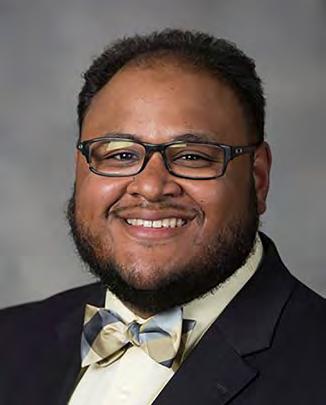
Dear Charger Family,
What an exciting time to be at Providence Day School! I joined the Charger community in July 2021 and have been impressed by the thoughtful, intentional, and ongoing work related to diversity, equity, and inclusion (DEI). The multi-prong approach focusing on data and demographics, curriculum, connectivity, faculty development, policies, and programming has set the institution on a path for excellence and I am honored to continue and collaboratively advance these efforts. The work outlined in this summary report demonstrates that DEI has been woven into the fabric of PD for over 20 years, making it the leader in the greater Charlotte area; yet, great work lies ahead.
To help kick us off, we have renamed the Office of Equity and Inclusion to the Office of Equity, Inclusion, and Belonging (EIB), a reflection of the depth and breadth of the office’s mission and the community we desire to cultivate at PD. Belonging is an essential part of our community and we are committed to ensuring that each member feels valued, validated, respected, included, and supported. As Dr. Nadia Johnson mentioned in her letter, we will begin a tradition of producing a condensed annual report outlining the progress and development of our equity, inclusion, and belonging strategic goals. The annual report will be a part of the accountability process in ensuring EIB remains a priority for the institution. Until then, I encourage you to become acquainted with the content of this summary report, reflect on where we have been as a school community, pause to appreciate where we are, and reach out with ideas of how you can contribute to making PD a more equitable and inclusive environment.
It is my belief that equity, inclusion, and belonging is a shared responsibility and I look forward to leading, serving, collaborating, and celebrating.
Sincerely,
 Tyrone Jean Director of Equity, Inclusion, & Belonging
Tyrone Jean Director of Equity, Inclusion, & Belonging
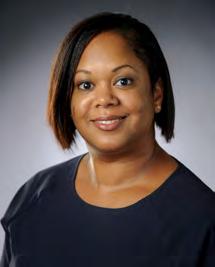
Dr. Nadia Johnson became the Director of the Office of Equity and Inclusion in 2016. Prior to transitioning to the office, she taught in the Upper School English Department Her primary responsibilities have included providing strategic leadership in the area of equity and inclusion, partnering with admissions to recruit and retain students from various backgrounds, promoting multicultural and global curricular integration as well as TK-12 alignment, conducting internal and external faculty training sessions that promote cultural competency and cultural awareness, and recruiting and retaining faculty and staff from diverse backgrounds.
Prior to joining PD, Dr. Johnson taught at the University of Miami, where she received her doctorate in Cultural, Literary, and Gender Studies. In particular, her studies focused on race, gender, and national identity formation in the Caribbean and Latin America. She continued to explore her interests in cultural politics, identity formation, and social justice during her tenure at PD, both in the classroom and in her role as Director of Equity and Inclusion.
Dr. Johnson authored “The Culturally Responsive Classroom Without Borders” , which was published in Independent School magazine.
Effective in July 2021, she will become the Assistant Head of School for Curriculum and Community at Castilleja School, an independent school for girls and young women grades 6-12 in Palo Alto, California.
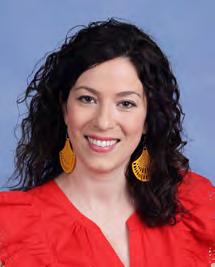
Nora Hudson, the Associate Director of Multicultural Programs, joined the Office of Equity and Inclusion in 2018. She is responsible for planning and executing TK-12 and community programming as well as supporting the Director of Equity and Inclusion in executing initiatives informed by the school’s strategic framework. She collaborates with faculty, parents, and student groups to facilitate integration in multicultural and inclusion programs within the school community.
Hudson also supports student affinity groups across all three divisions, serves as the faculty advisor for both the Hispanic/Latinx Affinity and the Multiracial Affinity groups, oversees the student cohort for SDLC (Student Diversity Leadership Conference), and works with counselors to develop advisory lessons that align DEI with social and emotional learning.
In addition to her work with students, Hudson also partners with the Director of Equity and Inclusion and the Assistant Head of Academic Affairs to plan and execute faculty professional development, which has included the all-school book reading of “The Racial Healing Handbook” and trainings with Ali Michael, the co-founder and director of the Race Institute for K-12 Educators. Additionally, Hudson
worked on a team to create a microsite with resources on race for the PD community, now available in Charger Commons Resources.
Effective in July 2021, Nora will become the English Language Learning Catalyst at Trinity Episcopal School in Charlotte, North Carolina.

Jana Dorsey joined the Providence Day community in September 2020. In her capacity as Associate Director of Equity & Inclusion Outreach, she focuses primarily on marketing/communications and connectivity groups with alumni of color, allies, and families of currently enrolled students. She runs the social media accounts @PDInclusion (Instagram /Twitter );
@PDEquityInclusion on Facebook .
This year, Dorsey delved into ramping up the Equity & Inclusion social media pages. She had the opportunity to work closely with the WIE (Women’s Intercultural Exchange) as they facilitated the Listening Sessions that took place in February and March of this year. Jana meets regularly and works directly with AFIRM (Alumni Fostering Inclusion Respect & Multiculturalism), the Anti-Racist Task Force, and the newly launched Black Families Network. She assisted with the creation of a microsite with resources on race for the PD community, now available in Charger Commons Resources.
Prior to moving to Charlotte for this role, she worked in operations for current U.S. Secretary of Transportation Pete Buttigieg’s 2020 Presidential Campaign in South Bend, Indiana and Las Vegas, Nevada. Additionally, Dorsey spent 5+ years working in admissions, enrollment management and student affairs at Northeastern University in Boston, Massachusetts.
Providence Day has six faculty coordinators who work with the Office of Equity and Inclusion. In the 2020-21 school year, they were:

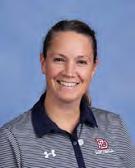






With 72 countries of origin represented on our campus, for many years Providence Day has invested strategically in increasing all forms of diversity among its students, faculty, and staff.
SENIOR LEADERSHIP TUITION FINANCIAL ASSISTANCE SPENDING
$4,584,500


In recent years, Providence Day’s curriculum has moved to intentionally incorporate the experiences of marginalized and underrepresented groups in core classes. Five years ago, the school implemented the PD Passport, which contains the skills, traits, knowledge, and global competencies that each PD student will acquire by graduation. The passport serves as a guideline for each curricular review.
POSITIVE IDENTITY AFFIRMATION AND FOUNDATIONAL UNDERSTANDING OF BIPOC HISTORY AND CULTURE
In the early years of Lower School, curriculum serves to positively affirm the identity of every student by providing windows and mirrors that allow all students to see themselves reflected as well as expose them to the experiences of others. This begins with culture surveys and continues with selfportraits, name projects, family traditions, and religious celebrations. Physical attributes are affirmed and celebrated with the inclusion of diverse literature and multicultural skin-tone materials used for projects such as the self portraits. Classroom conversations provide students the language to challenge bias, racism, and stereotypes. Global studies focus on Canada, Mexico, Kenya, China, India, and Germany.
First through fifth grade emphasizes Black, Indigenous, and People of Color (BIPOC) history and culture which includes but is not limited to: hidden figures, biographies, immigration, civil rights, and social justice activism. They also learn about contributions women and people of color have made to aviation, human rights, government, and performing and visual arts. Additionally, students engage in perspective taking, such as learning about colonization from the experience of colonized people. The latter grades build on students’ introduction to the major world religions through a scaffolded religious literacy curriculum.

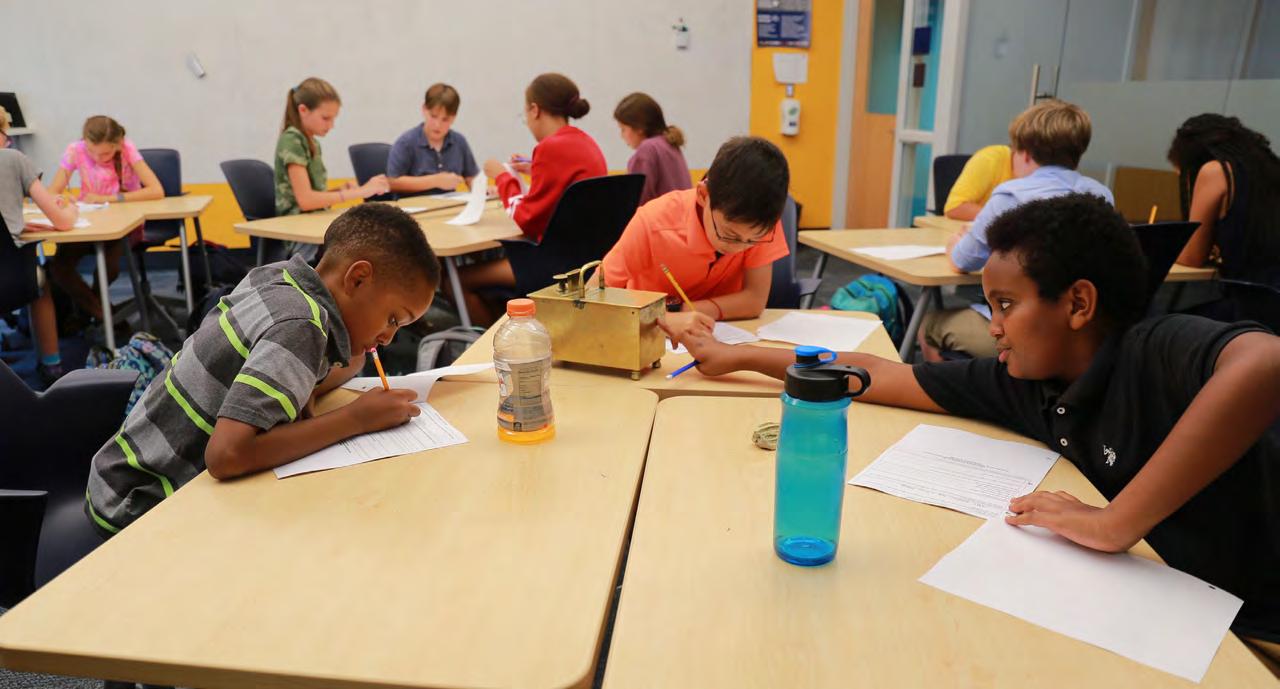
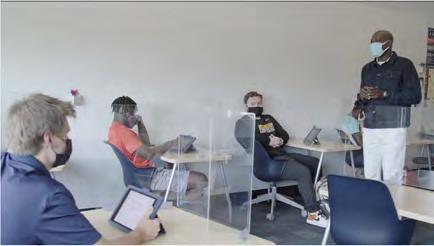
FOSTERING AN INCLUSIVE COMMUNITY, ELEVATING VOICES OF MARGINALIZED COMMUNITIES, AND BUILDING SKILLS THROUGH PERSPECTIVE TAKING
In Middle School, students gain the knowledge and skills necessary to intentionally build inclusive communities. Throughout the curriculum they learn about the histories of peoples that are not typically covered in traditional curriculum such as that of the ancient African civilizations, including Kush and the Black pharaohs, as well as that of the indigenous aboriginal populations of Australia and the First Peoples of Canada. In class, they explore why the histories of some populations have been historically elevated above others. This development of critical thinking skills continues with their study of the founding documents of the United States. In their examination of the statements “All men are created equal” and “We the people,” students interrogate: Did these ideals apply to everyone? Who was included? Who was left out? Do we currently live up to these ideals?
They continue to explore these themes through the study of literature and art, contemplating how stereotypes and cultural biases are formed, acted upon, and challenged. Middle School students also examine how governmental policy can result in inequitable environmental impacts on communities. The knowledge and skills cultivated in the classroom come together in the grade level capstones that focus on building community through collaboration and problem solving in 6th grade, engaging empathetic design to make communities more inclusive in 7th grade, and supporting United Nations sustainability goals by evaluating existing solutions and creating a learning experience for younger students in 8th grade.

The Upper School curriculum builds on that of Middle School through a comprehensive study of political, socio-economic, and cultural systems. In 9th grade, students think critically about what it means to be a citizen by examining aspects of the justice system, governmental policy, and their impact on marginalized communities. In particular, they learn about redlining and other forms of housing discrimination and the impact it has on immigrants, both documented and undocumented, and African-Americans that moved up north as part of the Great Migration.
During the Charger Impact Challenge, a co-curricular experience, students further explore the topics of housing discrimination and affordable housing specific to the city of Charlotte. In 10th grade, students learn about the political development of African Kingdoms and states throughout the continent and the impact that colonization and imperialism has had on the modern African state. In English, students explore the concept of white supremacy in The Great Gatsby as well as learn about diverse approaches to racial uplift during the late 19th and 20th century in their reading of Zora Neale Hurston’s Their Eyes Were Watching God. In the latter years of Upper School, a wide array of elective courses are offered that allow students to continue to build and apply their knowledge of equitable systems. These include: African-American Literature, Latino American Literature, Decolonization, Human Rights and Genocide, Advanced level World Language Courses, AP Computer Science, and a selection of Global Issues courses in the Global Studies Program.
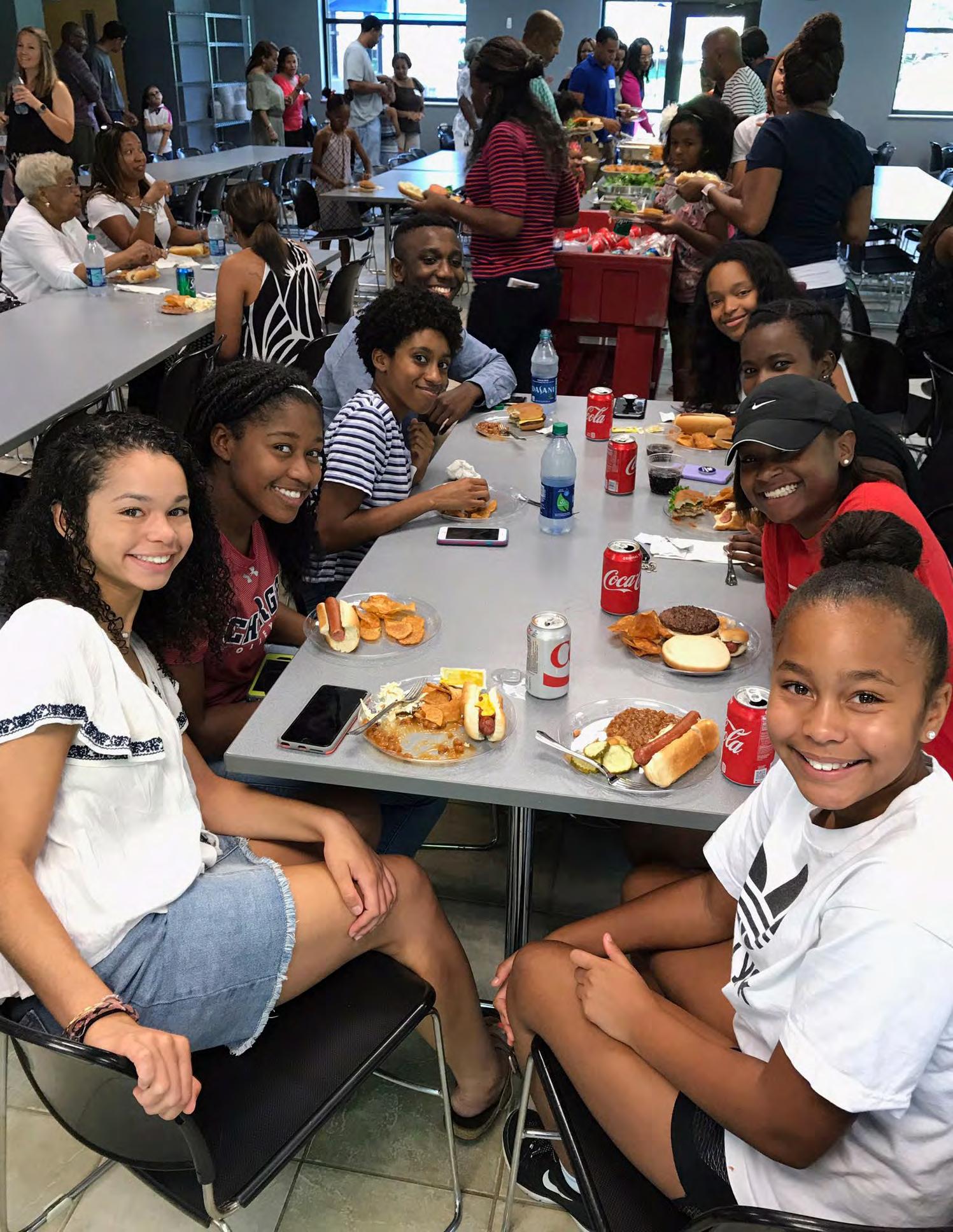
A core function of the Office of Equity & Inclusion is providing avenues for connectivity and belonging throughout the Providence Day community. That means facilitating student affinity groups in all three divisions; creating safe spaces for faculty to gather and discuss issues around anti-racism; creating new ways for our alumni to network and stay involved with the school; and fostering connections within and between our parents and the school.
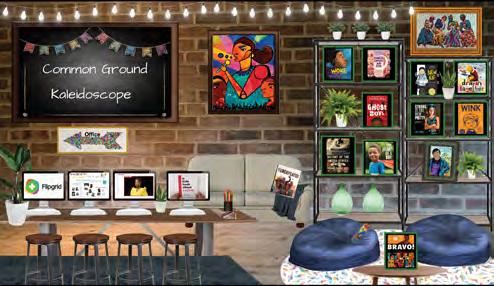

• Kaleidoscope 4th and 5th grade (2019) — a space for students with a shared interest in equity & social justice learning
• African-American and Asian Affinity Group for 4th and 5th grade (2020)
• Diversity Club (2018)
• (CEED) Council for Education on Equity and Diversity (2020) — a space for students and faculty to educate and inform the middle school community about diverse backgrounds
• Fellowship of Christian Athletes (1995)
• Gender and Sexuality Alliance (2015; Formerly HRA)
• Black Student Union (2016)
• Asian Affinity Group (2017)
• Jewish Culture Club (2017)
• (SAGE) Students Advocating for Gender Equality (2017)
• Multiracial Affinity Group (2017)
• Hispanic / Latinx Affinity Group (2018)
• (AMEMSA) Arab, Middle Eastern, Muslim, and South Asian Affinity Group (2020)
(2017)
The Student Diversity Council serves as a liaison between students and Upper School administrators to ensure the needs of diverse students are being met and to propose ways to make PD more inclusive and equitable.
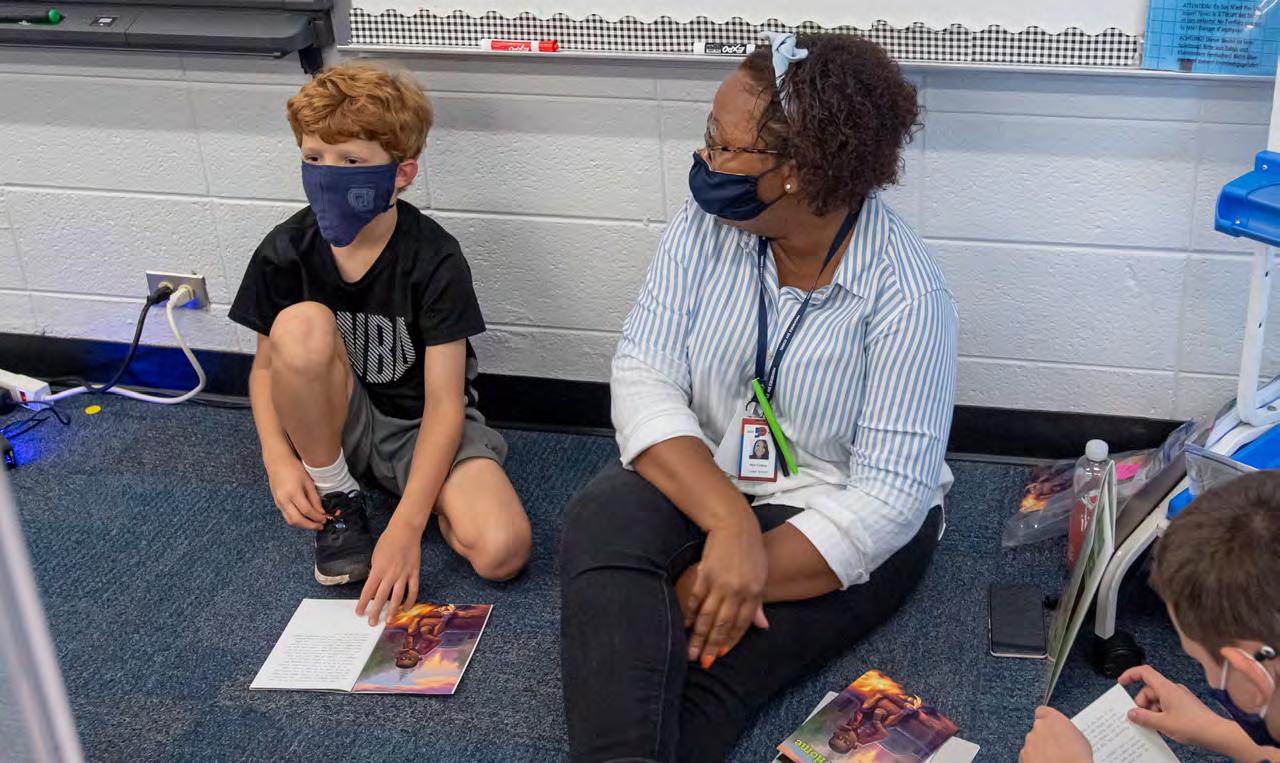
• Faculty of Color Group (2018)
PURPOSE : To provide a space for social connection and social emotional support among faculty of color. To serve as an opportunity for networking, community building and dialogue.
• AWARE (2019) (Alliance of White Anti-Racist Educators)
MISSION : Adults in the community who identify as white meet to provide a space for inquiry as we increase our understanding of how racism functions in our society, as well as in ourselves, and examine the role of whiteness and white privilege. Additionally, we build skills in being accountable allies to people of color; develop strategies for interrupting racist situations and dismantling white supremacy culture; increase our ability to support other white people to do anti-racism work; and build an action plan of concrete next steps, including hosting an ongoing forum for white antiracism work on our campus.
• AFIRM (2020) (Alumni Fostering Inclusion, Respect & Multiculturalism)
MISSION: We exist to promote and advocate for equity, and inclusion work at Providence Day, while also uplifting underrepresented voices at the school
VISION: We commit to establishing an environment where underrepresented and intersectional groups are celebrated, empowered, and supported through advocacy and cultural competence. We aspire to create a more diverse experience and equitable education.
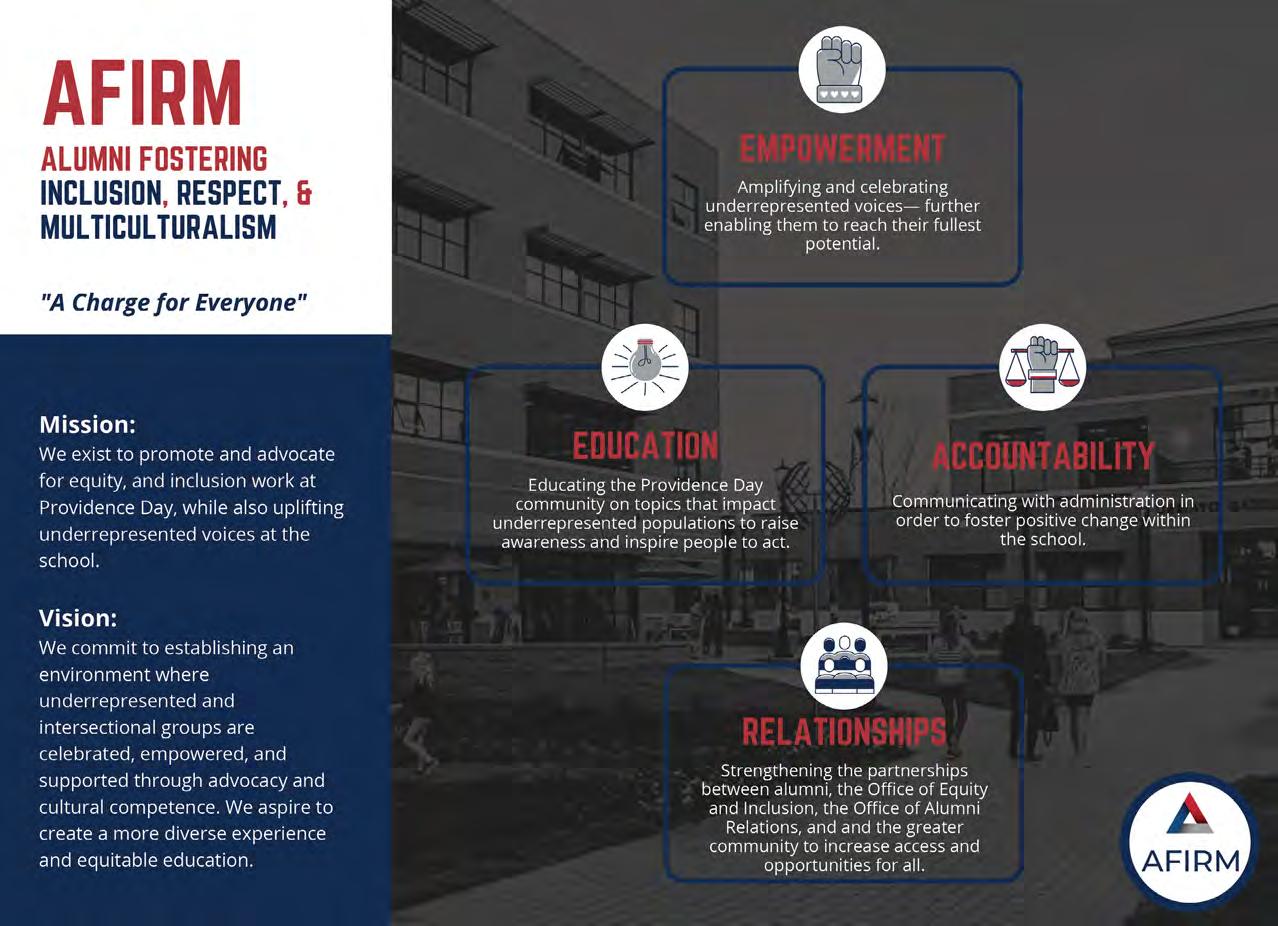
• Anti-Racist Task Force (2020)
Established in the Summer of 2020, the Anti-Racist Task Force evolved from the Multicultural Advisory Board. This parent-led group is committed to supporting the objective of working towards becoming an anti-racist institution. Members of the task force are current parents, alumni, and alumni parents. A chair and co-chair lead the group and work directly with The Office of Equity and Inclusion and School administration.
• Black Families Network (2021)
Newly established group focusing on relationship building, dialogue, networking, and community building among Black families.
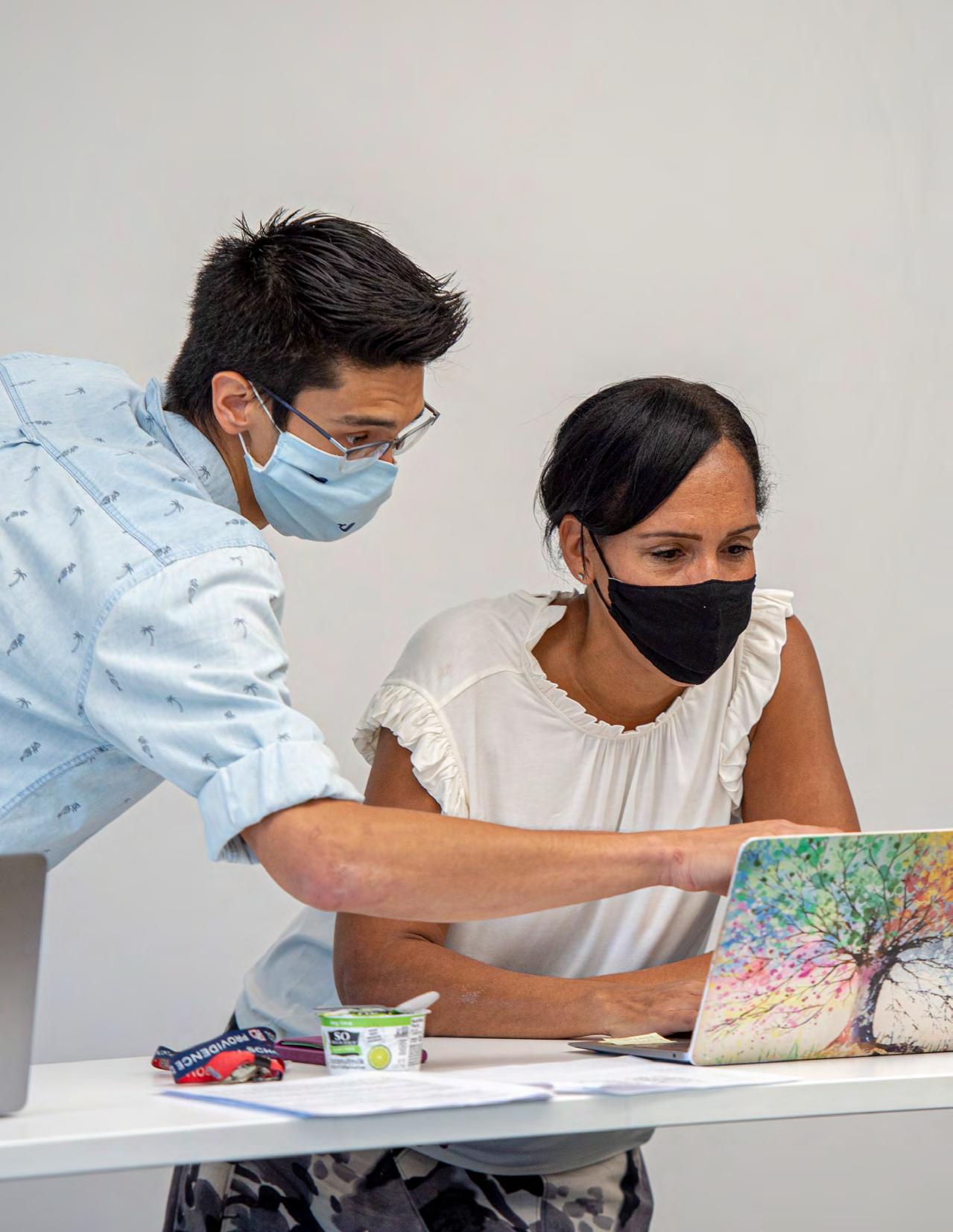
Over the past five years, Providence Day’s faculty have had access to a wide range of training opportunities in issues surrounding diversity, equity, inclusion, and anti-racism. From workshops and conferences to visiting speakers and internal presentations, the scope and content have developed significantly and intentionally over time.
2016-2017
• Lower School Human Experience and Perspective
• Unconscious Bias in Hiring
• Understanding Culture - Shallow, Surface, and Deep: how it informs our interactions, relationships and teaching
• “ The Complexity of Identity: Who Am I?” Beverly Daniel Tatum
• Cultural Competency, Awareness, Sensitivity, and Microaggressions
• Understanding Cognitive Dissonance and the Need for Affinity Groups
• Creating a Gender Inclusive Environment with Jennifer Bryan
2017-2018
• Understanding Cultural Learning Styles and Culturally Responsive Teaching
• How to Create a Culturally Responsive Classroom
• Supporting Gender and Sexuality Identity in Schools
• How to Interrupt Bias in the Classroom
2018-2019
• Ali Michael (Race Institute for K-12 educators)
÷ Exploring your racial identity
÷ Understanding racial identity
÷ Providing Academic Leaders with training and tool kit to advise and support their faculty
• Religious Literacy Training

2019-2020
• W hy Race Matters in Schools, Ali Michael (Race Institute for K-12 educators)
• Race Dialogue Training
• Faculty Summer Professional Development:
÷ W hite Awareness
÷ The 1619 Project
÷ Equity and Grading
÷ The Person You Mean to Be: How Good People Fight Bias
2020-2021
• All school book reading: The Racial Healing Handbook: Practical Activities to Help You Challenge Privilege, Confront Systemic Racism and Engage in Collective Healing
• Racial Identity Development and Racial Socialization, Ali Michael (Race Institute for K-12 educators)

• Identity, Perspective, and the Culturally Responsive Classroom


For many years, Providence Day has pro-actively reviewed all policies from TK through 12 to ensure they align with the school’s values and mission as a welcoming, inclusive environment. Student handbooks spell out policies on hate, bias, and harassment; multiple initiatives have expanded the school’s inclusiveness on gender and sexuality. Additionally, the school’s Human Resources policies have been reviewed and expanded to emphasize inclusiveness and well-being for all faculty and staff.
With the safety and emotional well-being of our students as our top priorities, issues surrounding insensitive, disrespectful, or malicious comments or actions - especially those centered on issues of race and ethnicity, gender, sexual orientation, religion, ability, and socio-economic status - will be handled with a multi-pronged approach focused on education, social/emotional well-being, restorative justice, community restoration, and accountability. Any situation that involves the use of a racial slur, inappropriate jokes, or innuendos directed at an
individual or group which are based on physical characteristics, stereotypes, or cultural biases will not be excused or tolerated. Administration will work in conjunction with the Office of Equity and Inclusion to determine outcomes, including, but not limited to, suspension. A continued pattern of behavior, or issues of a severe or extreme nature, could lead to expulsion.
In response to requests for a system to report incidents of hate and/or bias*, PD has created an electronic form that members of our community can access to report incidents to be investigated by the administration. This reporting system will allow Providence Day School to monitor and effectively respond to activity that negatively impacts the campus climate and our sense of community. Reporters do have the ability to report anonymously. In addition, a report will be generated for all incidents, including those made in person. This will make it possible to identify trends or patterns.
The form can be accessed via the Equity and Inclusion Resource page found in Charger Commons. If a reporter prefers not to use the electronic form, a PDF of the form can be printed to fill out and submit by mail. A detailed process for investigation can also be found with the reporting form.
*A bias incident is any speech or other action that conveys prejudice against individuals based on their race, color, religion, sex, age, national origin, disability, sexual orientation, gender identity, alienage or citizenship status, creed, or any other protected characteristic as established by law.
Providence Day School is enriched by the diversity of its members. The school recognizes and respects individual differences in regard to race, color, gender, national origin, identity or orientation, religion, age, and disability.
In order to provide an atmosphere of sensitivity, acceptance, and mutual respect, it is important that every member of the community – including administration, faculty, other employees, students, and visitors – recognize certain guidelines for appropriate and acceptable behavior. Symbols associated with intolerance and hate (including but not limited to the Confederate flag or swastikas) are prohibited and may not be displayed in any form. Verbal or physical behavior that subjects a member of our community to personal indignity is deemed harassment and will not be tolerated whether it occurs on or off campus.
Harassment includes but is not limited to playing abusive or humiliating jokes upon a member of our community or frightening, scolding, or causing mental or physical harm to that person. Such behavior also includes unwelcome physical advances or contact, overt displays of affection, the display of sexually explicit or suggestive material, or unwarranted verbal remarks.
Other examples of unacceptable behavior include:
• Vulgar language, racial slurs, jokes or innuendos directed at an individual or group, based on physical characteristics, stereotypes, or cultural biases.
• Pressure to use alcohol or drugs.
• Obscene or suggestive remarks or jokes, as well as verbal insults and abuse.
• Pressure to engage in sexual activity, whether explicit or implicit.
• Photographs, pictures, or printed material which others might find offensive or degrading.
• Comments that are demeaning with respect to race, color, sex, religion, age, disabilities, identity, or ethnicity.
Conduct as described above, even by or among members of the same, sex, race, color, religion, national origin, identity, or age, as well as by or among disabled persons, also may constitute harassment. In addition, Providence Day School’s policies and disciplinary procedures regarding harassment apply to behaviors involving direct contact as well as the use of email, social networking websites, cell phones, or other technological devices.
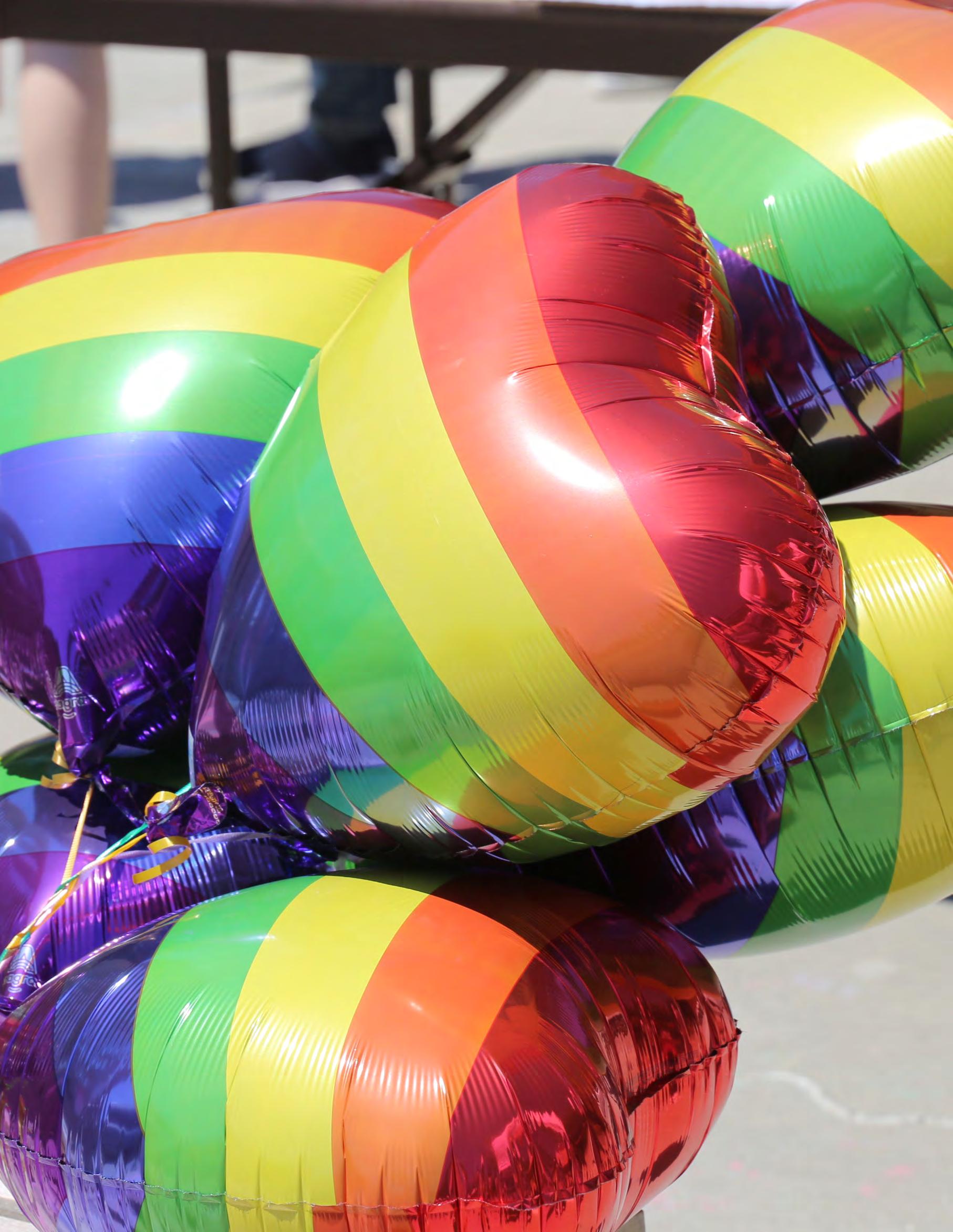
 Civil rights attorney James Ferguson has visited several times to stpeak with PD students
Civil rights attorney James Ferguson has visited several times to stpeak with PD students
Programming to support diversity, equity, and inclusion initiatives is woven throughout the fabric of the school. It begins with character education in Lower School; continues through the Middle School capstone projects; and remains a fundamental part of the Upper School experience in advisory and assemblies. Additionally, schoolwide programs offer the opportunity for parents to engage in dialogue around the issues their students are discussing.
Nora Hudson has planned and executed multicultural and inclusion programs, events, and speakers for the Providence Day community that support the vision provided by the Director. The 2020-2021 academic year, programs included:
SEPTEMBER 22, 2020
In celebration of Hispanic Heritage Month, the Office of Equity and Inclusion in partnership with the Upper School Hispanic/Latinx Affinity group hosted a virtual talk with first generation American Salma Villarreal. Salma spoke about the immigrant experience and talked about her work with Charlotte’s Hispanic community at OurBRIDGE for Kids, a non-profit organization for immigrant and refugee children.
NOVEMBER 16, 2020
In celebration of American Indian Heritage Month, the Office of Equity and Inclusion hosted an asynchronous screening of the documentary “Gather” with a subsequent debrief of the film with director Sanjay Rawal. “Gather” documents the growing movement among American Indians to reclaim their spiritual, political, and cultural identities through food sovereignty. The film follows an Apache chef as he attempts to re-establish traditional foodways on his reservation, a young Lakota woman as she studies the effects of the destruction of the buffalo on her peoples’ diets, and a group of young Yurok boys as they battle a large dam on the Klamath River.

JANUARY 19, 2021
In honor of the Dr. Martin Luther King, Jr. holiday, the Office of Equity and Inclusion, in partnership with the Greenspon Center for Peace and Social Justice, hosted a virtual talk with an interfaith social justice panel including representatives from the Presbyterian, Islamic, Catholic, Sikh, and Jewish faiths. Panelists shared how their religious tradition and/or local congregation approached the work of social justice and the discussion was followed by a Q&A.

9, 2021
For Black History Month, Providence Day hosted a panel on “The Legacy of PD’s Founding History and White Flight Schools in Charlotte” as part of our commitment made in summer 2020 to acknowledge the school’s founding as a white flight school. Panelists included: Dorothy Counts-Scoggins — civil rights figure, the first Black student to integrate Harding High School; Justin Perry — licensed social worker and community activist; Pamela Grundy- historian and author of “Color & Character: West Charlotte High and the American Struggle over Educational Equality;” and Roy Garrison - Upper School History teacher in his 37th year at PD. In addition to addressing our own history, the discussion also included the context of busing in Charlotte and the impact the creation of white flight schools had on desegregation efforts. The discussion is available for listening at www.ProvidenceDay.org/Podcast
MARCH 23, 2021
In celebration of Women’s Heritage Month, the Office of Equity and Inclusion in partnership with the Upper School Affinity group Students Advocating for Gender Equality (SAGE) hosted a virtual panel of four women leaders in Charlotte. Panelists included Julie Eiselt (Mayor Pro Tem, Charlotte City Council), Toni Freeman (President, Toni Freeman & Associates), Grace Nystrum (Strategic Marketing Executive, Bank of America), and Dr. Sophia Paige-Feemster (Founding Partner of Arboretum Obstetrics & Gynecology).
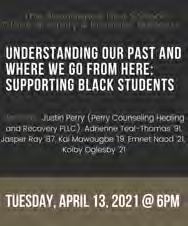
APRIL 27, 2021
APRIL 13, 2021

“Understanding Our Past and Where We Go From Here: Supporting Black Students” is a follow-up discussion to the one conducted in February. Panelists turned their eyes to the future. Community activist Justin Perry returned as a panelist, alongside alumni Adrienne Teal-Thomas, Jasper Ray, and Kai Mawougbe, as well as current students Emnet Naod and Kolby Oglesby. The discussion is also available at www.ProvidenceDay.org/Podcast .
Rainbow Day started in 2017 with the tagline “LGBTQ+ Day of Empowerment.” GSA members had participated in the Day of Silence each year in April, but in 2017 they decided that what the PD LGBTQ+ community really needed was a day of celebration rather than a day of silence. In 2017, the first Rainbow Day consisted of cookies, informational posters, rainbow spirit day, selling ribbons as a fundraiser, and student visual art. In 2018, the event added selling student-designed T-shirts and musical performances by students. In 2019, a book display from the Library was added; in 2020, students experienced a virtual event due to the pandemic; and in 2021, the on-campus celebration incorporated rainbow themed face masks.
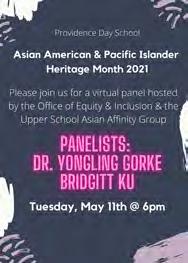
MAY 11, 2021
In celebration of Asian American Pacific Islander Heritage Month, the Office of Equity and Inclusion in partnership with the Upper School Asian Affinity group hosted a virtual talk with UNCC professor of practice in Chinese Dr. Yongling Gorke and UNCC senior Bridgitt Ku who is partnering with UNC Charlotte’s Atkins Library and History South to write a book detailing the experiences of Chinese Americans living in Charlotte.
In recent years, programming has moved toward more inclusive events; instead of being targeted as “Daddy” and “Mommy,” events are aimed at all parents or parental figures.
Grade-specific programming around Martin Luther King, Jr. is built into community meetings and curriculum. Additionally, each grade in Lower School experiences Character Education lessons and experiences throughout the year.
A sample from a fifth grade segment on the theme of “courage:”
Following a community meeting, students watch an excerpt from a show entitled “What Would You Do?” Using hidden cameras, the show establishes everyday scenarios and then captures people’s reactions. Whether people are compelled to act or mind their own business, John Quiñones reports on their split-second and often surprising decision-making process. Students then discuss with a faculty speaker and hear from a panel of Upper School Students who participated in the Student Diversity Leadership Conference.
Students learn the “Speak Up At School” structure (interrupt, questions, educate, echo) to coach and empower the students on how to handle difficult/harmful conversations.
• Courage: the ability to do something that frightens one.
• Bias: prejudice in favor of or against one thing, person, or group compared with another, usually in a way considered to be unfair.
• Stereotype: a widely held but fixed and oversimplified image or idea of a particular type of person or thing.
• Prejudice: the belief or perception that people of different cultures are inferior or have negative characteristics because of their skin color, religious beliefs, or cultural background.
• Discrimination: the act of denying someone their rights on the basis of prejudice.
• Upstander: an individual who sees wrong and acts. A person who takes a stand against an act of injustice or intolerance.
In Spring 2021, Dr. Sandra Chapman led three workshops for Lower School parents on talking to kids about race. Sandra (Chap) Chapman, Ed. D. is the Founder of Chap Equity, an organization rooted in the belief that, through teamwork, we can learn more about ourselves and others; discuss and discover the foundational research needed to address the needs in a community; create conversations that support individuals where they are; and confront barrier issues and create actionable steps towards building stronger educational communities.
The 6th grade capstone is a collaborative, problem-solving experience in which students are engaged in the design of real-world solutions based around the theme of “building community.” While the capstone days take place at the end of the 6th grade year, the 6th grade team sets the stage for their spring capstone work in the fall. Throughout the fall semester, 6th graders take part in various activities designed with “community-building” in mind. After spring break, sixth graders are introduced to six subthemes related to “building community” on our campus. They include building relationships, healthy living, environmental responsibility, digital citizenship, traditions, and equity and inclusion. Each student selects sub-themes that interest them. Sorted by students’ choices, teams of approximately ten students are created. In May, these teams collaborate during their capstone days. Each team is led by a 6th grade teacher who guides their group through a problem-solving process. The goal for each team is to design a product, policy, or experience that positively impacts the PD community. At the end of their three-day capstone experience, teams present their solutions and designs to their peers. Some of these designs have become a part of our Middle School culture.
The 7th grade class continues to experience empathetic design as an end-of-year capstone project. In May, students work in teams with a faculty facilitator to address the overall theme of inclusion. Ultimately, students are challenged to design or create an action, product, or experience that makes our city or state more inclusive.
To jump-start the capstone, we invite eleven Community Partners to be a part of this experience with students. In January, the Community Partners come to campus to meet our 7th grade faculty, who give them a framework for how they can share their stories about inclusion. Community Partners then share their expertise, tell their story, and invite curiosity in a way that inspires our 7th graders to want to take action. These presentations either take place during class meetings or they are spread out between English, History, and Science classes throughout the spring.
Our Community Partners represent a wide range of experiences and perspectives centered around the theme of inclusion. In May, students choose a Community Partner and work collaboratively in a small group to design a possible community solution for them.

Eighth grade students take part in a capstone project during the winter exam period. The 8th grade capstone connects to the United Nations Sustainable Development Goals . Students rank topics that are inspiring to them, and groups are made from those rankings.
Students are asked to work towards multiple goals surrounding these topics. First, they research and define a problem they want to solve related to their UN topic, then evaluate an existing solution to this problem. Then, they design an experience for younger students that helps them understand the complexity of this issue. Not only do we want to give students a chance to think deeper about world issues, we also want to use this opportunity to help students develop their collaboration and communication skills.
Advisory is a space for students to grow in self-advocacy, social-emotional skills, and academic management. Students engage in co-curricular programming several times each month engaging in civil discourse. There is an intentional emphasis on social and emotional skill building alongside cultural competency and character dispositions (empathy, open-mindedness, courage, respect, conscientiousness, and integrity from the PD Passport). Advisory Programming, which is modeled after community groups and diversity dialogues, provides real world opportunities to practice communication skills and build relationships through discussion and case studies. These conversations encourage participants to share varied perspectives, listen carefully to each other’s stories, and to act with each other in mind. Advisory Programming allows us to identify challenges and make plans for action.
Programming for the 2020-2021 academic year has included:
• The Immigrant Experience with guest speaker Selma Villarreal from Our Bridge For Kids
• Martin Luther King Jr.’s legacy of racial justice work. Charles Winton (father of PD Alum Martin Winton ’16) presented on Dr. King’s sanitation workers’ strike movement.
• Black Student Union leaders interviewed Dorothy Counts-Scoggins on her experience integrating Harding High School in 1957.
• Silent Images film series “The Mile’’ features people from different backgrounds as they collaborate, listen to each other’s perspectives, and confront the hard realities surrounding race. “In Worlds (Not So) Apart”, Charlotte pastor Charles and elder Femi walk side by side through the West Charlotte community they serve and talk through their different upbringings as an African American and a Nigerian, what it means to be a bridge in a multicultural context, and what it takes to be an instrument of change in our community.
• Jewish Culture Club leaders and Rabbi Asher Knight discussed antisemitism to teach students to recognize what antisemitism is and can look like
• Acknowledgement of the shootings that occurred in Atlanta and discussion and education on the history of Anti-Asian sentiments
• Asian Affinity Group leader Caroline Chun along with Brian Li, Zac Bygum, and David Harris discussed the history of Asian Americans in the U.S. and the model minority myth.
• Nora Hudson and AMEMSA (Arab, Middle Eastern, Muslim, and South Asian) Affinity Group leader Khadeja Usmani interview Imam John Ederer of the Muslim Community Center of Charlotte on Islam and the Muslim community to provide the PD community accurate information about the religion and its followers to counter inaccurate and negative stereotypes.
• Black Student Union students created a video to lead the US in a moment of silence to honor George Floyd and others who lost their lives to police use of lethal force and to prompt discussion on the use of lethal force and its impact on the Black community.
Assemblies in the Upper and Middle Schools provide opportunities to educate, celebrate, and hear voices of the diverse constituencies in the PD community. Assemblies provide recognition of important events, ideas, and figures and highlight heritage months, religious observances, and historical and current events. Assemblies also provide education from experts to build on the 21st century skill of cross-cultural competence. Assembly topics include, but are not limited to: Hispanic Heritage Month, Native American Heritage Month, Black History Month, Women’s History Month, Arab American History Month, Martin Luther King, Jr. Day, Diwali, Nowruz, Passover, Holi, Ramadan, Vaisakhi, Eid Al Fitr, and Racial Competency as a 21st Century Skill.
